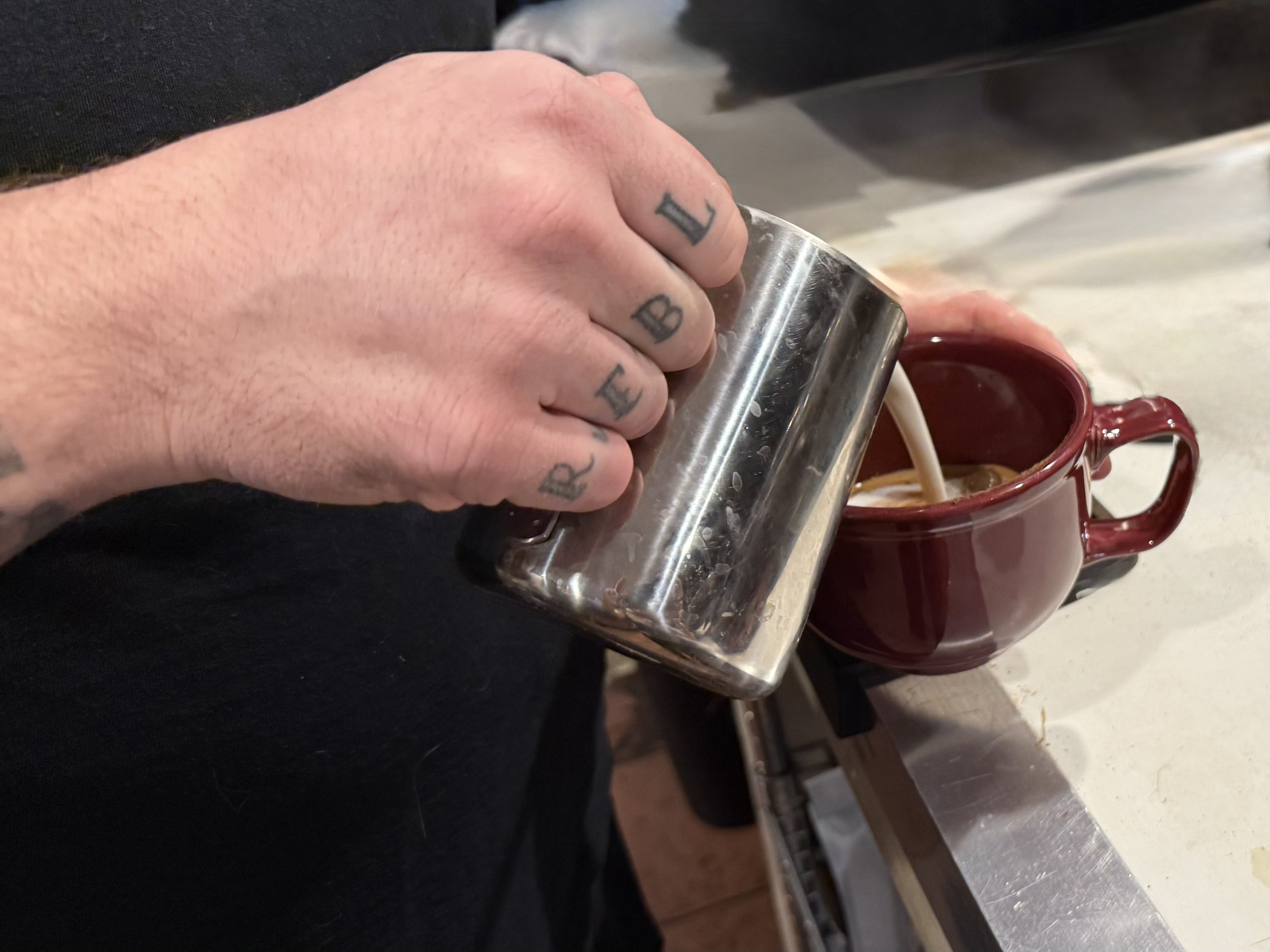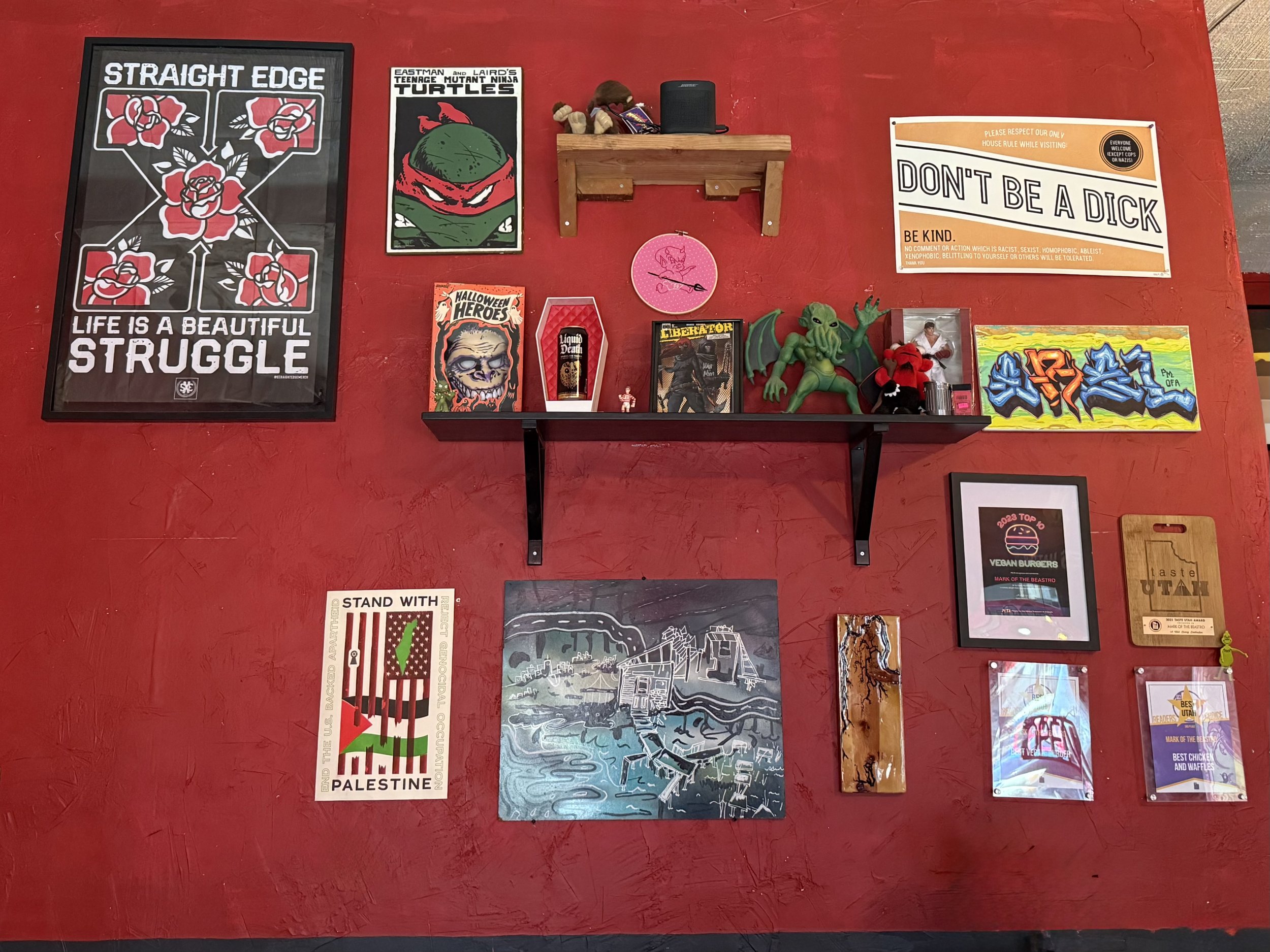Mark of the Beastro
“The address was 666 South State Street. I said, ‘Let’s go first thing in the morning.’ That’s too good to pass up.” When Andrew Earley stumbled upon the now-iconic location of Mark of the Beastro, it was the address that first grabbed him. The tongue-in-cheek name followed soon after, a nod to the playful spirit he wanted to cultivate - one part punk rock, one part art haven. What began as a full-service vegan restaurant in 2019 has since transformed into a cozy and welcoming café - one that shares its walls, and soul, with a vibrant performance venue known as The Beehive.
A velvet curtain separates the café’s relaxed, art-filled front space from The Beehive’s red-and-black painted walls, but Andrew’s vision ties them together. “The idea was always to create a third place - a space where people can just be,” he explained. “At first, we thought that would be through a restaurant, but over time, the cafe and live art space made more sense. It’s more flexible, more sustainable, and way more aligned with who we are.”
Andrew, who grew up in Davis County and spent much of his youth in Salt Lake City, has always felt most at home in coffee shops and concert spaces. After a winding journey that included stints as a short-order cook, bar manager, counselor, and even poet, he found that community programming offered him the strongest sense of purpose. “Coffee was always my first love,” he admitted. “And when you pair that with music, art, and the kind of inclusive space we wanted to build…well, it just fits.”
The menu still reflects Andrew’s creativity. Though the restaurant no longer runs full-time, the weekend specials and house-made staples remain a draw. “Our lemon barbecue glazed tofu panini with pears, roasted red peppers, pesto, and vegan mozzarella - that’s one of my favorites. And the portobello panini with mango chutney and sun-dried tomatoes has a deep, rich flavor. We’re still cooking, just with a smaller team and even more intention.”
But the heart of the space lies behind that velvet curtain. The Beehive now hosts more than 200 events a year - everything from punk shows and drag performances to poetry slams and community game nights. It is also home to AMP Utah (Alternative Music and Arts Program), the nonprofit Andrew co-founded to provide funding, support, and space for grassroots creative groups that might otherwise be overlooked. “We’ve always been committed to showing up for the people who don’t get institutional backing - the ones doing burlesque, slam poetry, metal shows, or fundraising theater. This is their home.”
The most meaningful partnerships AMP Utah fostered was with Salt City Slam, one of the longest-running poetry slams in the country. “We just celebrated thirty years,” Andrew said, lighting up. “That’s poetry with no nonprofit, no permanent home, just people keeping it alive. So, we brought it into The Beehive. Now we’ve got poets’ brunches, monthly slams, and some of the biggest names in spoken word performing right here in this little room. It’s incredible.”
The impact is tangible. Several artists who have performed or participated have returned as teachers or leaders. Andrew dreams of growing even more, turning The Beehive into a space humming with workshops, yoga, maker classes, and, one day, broadcasting local art and music via a low-power FM station. “We’ve got the license. We just need the equipment,” he said. “Imagine tuning in and hearing local bands, poetry, even Democracy Now - just voices that matter.”
Inclusivity is central to Andrew’s vision. Though he, himself, gave up alcohol some twenty years ago, he added beer and wine to the menu to make guests feel comfortable and reduce safety concerns tied to people drinking off-site. “I want to be the place where everyone feels welcome, no matter who they are or what they believe, as long as they treat others with respect,” he said. “We’re proudly LGBTQIA-supportive, anti-racist, and committed to keeping this a space where people can show up as themselves.”
As for the aesthetic, it is a little grungy, a little punk rock, with a Bart Simpson skateboard, local pieces of art everywhere, and comfy couches for lounging. They have red and black walls, a pentagram flag, a statue of Baphomet, murals, memorials, and, according to Andrew, "A whole lot of love. I want it to be a place where one can walk in, find their people, find their voice, and maybe, just maybe, find a little bit of themselves, too."



























